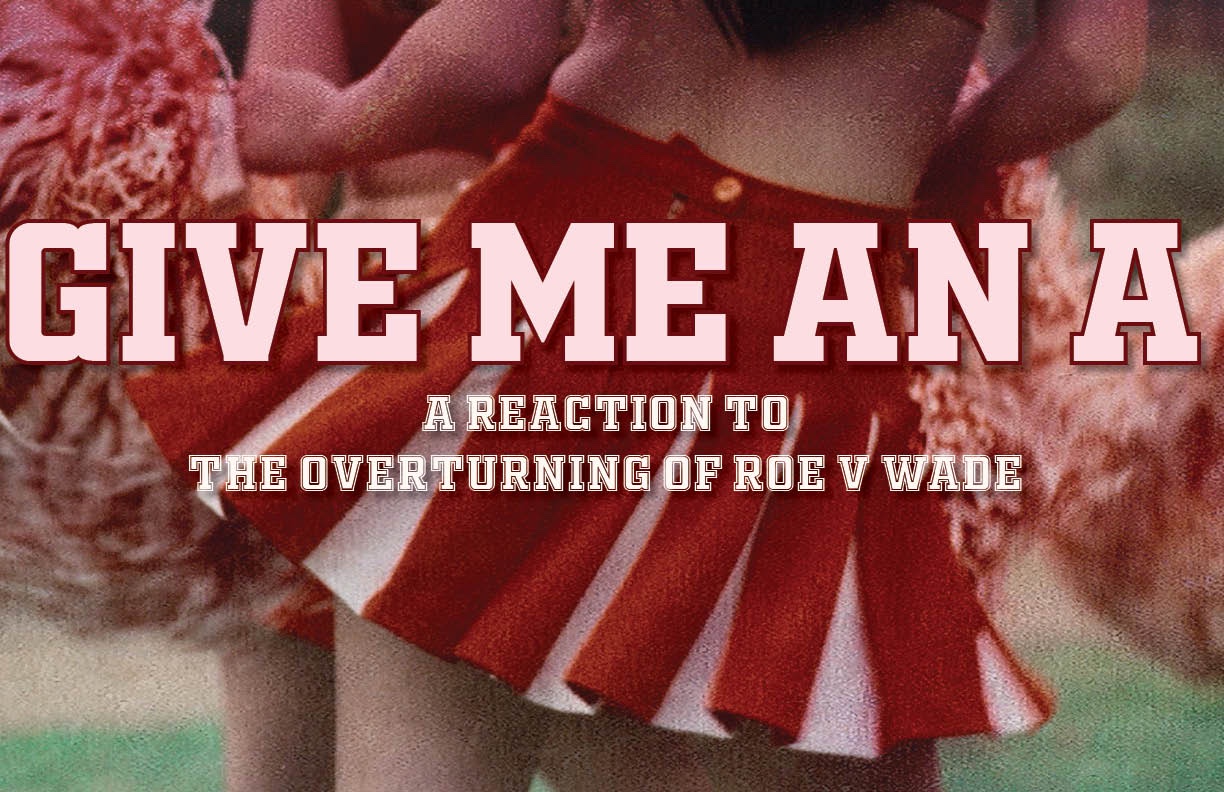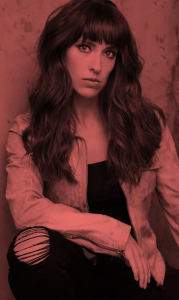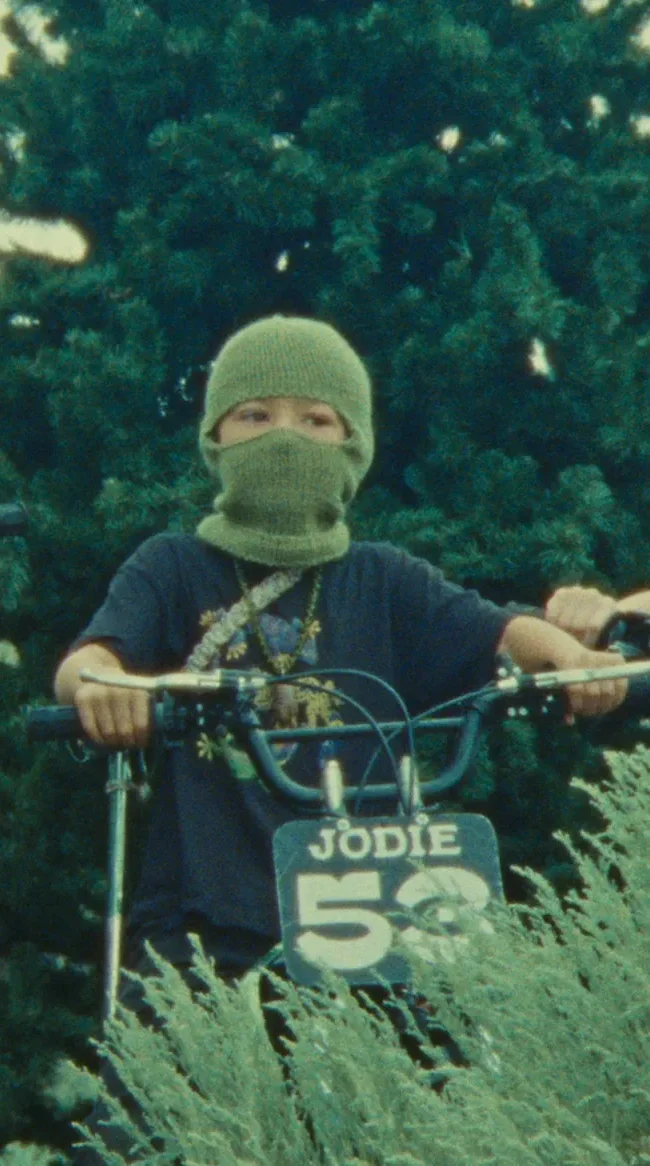A Conversation with Natasha Halevi (GIVE ME AN A)

It can take forever to make a movie. That’s why sometimes movies often seem to drag way behind the issues of the day. So when I heard about the Roe versus Wade Overturn anthology response film Give Me An A, that went from conception to premiere in less than four months, I knew it had to be a singular production. And to illustrate one of the most important discussions of the day, producer and director Natasha Halevi put together a team of distinct female voices to approach the issue – I almost said from all sides – from their own distinct point of views. No, this is not an unbiased examination of reproductive rights, but when film makers feel like their own human liberties are being stripped away they find ways to respond as only they can.
17 different filmmaking teams came together in Give Me An A. 16 different shorts and a wraparound pulls the pieces together. The film made its premiere virtually at Fantastic Fest and has since gone on to play at as many festivals as the producer can book because in her words “I made this movie to be seen.” I had a chance to sit down with Halevi and talk about putting together this is important and yet still unwieldy production circus to use art to make a difference.
Hammer to Nail: All right. So, let’s talk this project. Take me back, June, what? 21st?
Natasha Halevi: June 24th. Yes. Gosh. We all knew what was coming. This has been coming for years. Then of course we’d seen the leaked ruling, but for some reason, I think no one really wanted to believe that could even happen. Especially, once the ruling was leaked, and people were protesting, we all knew you can’t protest against the Supreme Court. If they’re making a decision, they’re making a decision, that’s how the Supreme Court works.
HtN: They don’t change their minds, they’re not trying to get votes, they’re not trying to get elected.
NH: Which is what’s supposed to be protecting us, but in this case, is not protecting the majority of the people. All that knowing, it still just was so unbelievable. I was up early for… I was getting ready for an audition, and I was standing in my bathroom putting makeup on, and my husband, Sean, shouted out, “Hey. Roe versus Wade was overturned.”
I was like, I just happened to be looking in a mirror, and I just stopped everything, and instantly was on the ground. It’s like, I looked at my face, I felt like having a female face, that all of a sudden this meant that my life was changing drastically, because this was going to have an effect on all women, on anybody who presents as a woman, as anybody who has ovaries, as anybody who also was included in the words that were a part of that ruling. That contraception would go next, and that same sex marriage would go next, which seems unrelated, but obviously if people are making a corollary between those things, the intention behind this ruling is so much bigger and so much worse and so much about oppression than anything. Anyway, I still haven’t really answered your question. I found myself, it was almost as if I had passed out. I found myself on the bathroom floor just crying, and in a puddle of mess that didn’t make sense. It was like my body parts weren’t working right, my limbs weren’t working right.
I couldn’t breathe. I was so shocked at that reaction, because I’m up on the news. I’m aware of what’s going on. I’m educated. I’m lucky to have all those resources and have access to that, and I knew it was coming. I still was…I was physically on the floor.
HtN: So take me from the outrage to ‘I’m going to turn this into a film event.’ How did you make that decision, and what did you sort of decide would be the context of that in terms of what you were going to ask for and how were you were going to put it together?
NH: It took a couple days for me to realize I was having ideas about how to communicate some of the feelings. And I was realizing that some of those things that I wanted to communicate weren’t so obvious. They were things like, it’s bothering me that there are people being indifferent. It was things like, what could our workaround be. How do we find solutions, what are our workarounds if we can’t get the government to be on our side, how do we find other ways. And I started kind of, as a filmmaker, just thinking of those in sort of these weird narrative, the blob monsters, and whatever else, like crazy lands where things happen. And then I started noticing my other filmmaker friends through social media were sharing their points of view that we’re also uniquely different.
If we were all going to march, we would all be marching for the same reason. But, individually, the nuances of those reasons are very complicated and they’re very different. And there’s so much diversity and there’s so many different reactions. So within a week I got on a Zoom call with everyone, and we all talked about what those reactions were, and immediately I sent out a survey saying, okay, here’s how I think we can put this together. What’s your log line? What’s your story concept? And, you can either do this as in three different ways as a 60-second statement piece, as a micro short in the three to five minute range, or as a short film under 10 minutes.
So people checked off the boxes, they wrote their ideas, and we started working from there. I got a group of people to be sort of these mentor producers, who would read the scripts. We had a really fast turnaround for our first draft of scripts and immediately had people reading them. Sarah Smith, who’s a producer at Marvel, who is a producer at Vice, Judy Greer, who is an actress. We had people immediately who are very good at doing this work reading scripts and providing very, very poignant responses and comments and notes. So we were really lucky that we were able to take ideas that were sort of vague ideas and big scripts and just put them on a fast track to get them to being really solid scripts. And within less than a month of that, we were filming our first film.
Hammer to NailHtNdifferent point of views. I imagine when people heard you were doing this they came out of the woodworks nd it was hard for you to say no.

Filmmaker Natasha Halevi
NH: Yeah, so there are when I started this, I was tapped out at nine and I was like, “Nine people can be a part of this.” Typically, anthologies you have four or five pieces and you have these really distinct shorts, but with this many pieces, you have actually something that operates a little bit more like a feature film in that there are these little scenes that you go through. And so I’ve never seen an anthology with this kind of format with this many people. I think it’s pretty fun and it’s a nice way to sit down and follow a through line and follow an emotion and follow a response and a reaction over an hour and a half.
HtN: You kind of get lost in the length of it with there being so many of them, you don’t actually realize. I think one of the things that happens with an anthology is that sometimes it feels long because it’s like, “Oh, here’s another piece and oh, here’s another piece.” But when the pieces are 60 seconds, you don’t feel that way. It’s a little bit more like flipping the stations on the television where everything you stop on is pretty great, but as soon as it hits a commercial, you go to the next thing. And strangely, everything is about the same thing, but that was kind of my experience with watching it. And it was sort of my experience with the days after the news broke.
NH: Cool. I love that. I love that take on that for sure. It’s like you sat down on a TV that’s how people feel about this topic TV and you get to flip through.
HTN: Listen, I was watching, I can’t remember what sport it was, but I was watching sports that night and the commentators, three men, were talking about Roe versus Wade and how it was going to affect the sporting community. And I was like, people need to realize how much of a change this is and this isn’t just a single topic, this is going to cross everything. I don’t think anybody realized how ridiculous it was going to get, the idea that we were going to have 10-year-olds crossing state lines and vigilante doctors protecting people who… It’s just insane. I don’t think we had that idea, but just that day, the fact that everybody was talking about it, I think, should have given us a little bit of a sense.
NH: It should have, yeah. It should have been the red flag of, “Hey, this is time to drop everything and find a solution.” I think part of our problem is we live in a world where I can order a smoothie to my front door with bee pollen and flaxseed in it and it’ll arrive here in 20 minutes. So we’re all very comfortable and have access to luxuries, that’s an absolute luxury, and everyone can do it on their iPhone if they want to.
HtN: Or their Android, we don’t want to make choices for people.
NH: Yeah, yeah, yeah. I’m sorry, I didn’t mean to make choices for people. Apple brainwashed me. Yeah.
HtN: Apple who still funds candidates who are pro-life.
NH: Yeah. That’s not great. That’s pretty not great.
HtN: Yeah, but it’s not like Samsung doesn’t. I mean I’m sure you’d be hard pressed to find a company that only supports pro-choice candidates.
NH: Yeah, that’s probably true.
HtN: But maybe we should be able to.
NH: Yeah, probably we should.
HtN: I’m curious how you fund something like this with lots of different teams coming in and everybody having a different sort of budget, and obviously nobody has any money at all. This isn’t a project coming down from a studio or like Blumhouse that says, “Oh, we’re going to get these five…” that they’ve got money for it and they just make it happen. This is something that’s coming from ground up. So how do you make that happen?
NH: I mean, everything moved so fast. We’re talking about three months ago. I did in the first whatever, two weeks, try very hard to find small independent funding sources to bring onto the project. Almost every small production company I talked to just could not move at the pace that we were trying to move at. Also, there are lots of tricky things about dealing with unions when you’re funding something, right? Once you meet a certain threshold, you really have to abide by SAG theatrical guidelines.
So we worked with unions, we talked to the unions about how can we make this happen. One of the things that we were able to do is work with SAG on their micro budget contract. And each of these is basically a part of a series. So the micro budget agreement allowed us to move fast, but also meant we couldn’t spend above a certain amount, which really wasn’t very hard for us because we didn’t have anywhere near that amount to spend. So we sort of started going… This was mostly funded personally. I had a bank account that I’ve had for years that I’ve been using for saving up for a house down payment. And I’m like, what’s the point of owning a house if I can’t have rights? So who cares?
HtN: I mean, most movies are vanity projects.
NH: Right. Yeah.
HtN: Let’s be honest. Most movies are vanity projects because people want to make a movie. But this is something that you needed to do.
NH: This was a need. This was a need.So all of a sudden that money ceases to matter in that way. And what matters more is putting it towards women’s rights. Yeah. I mean, I don’t know that I recommend anybody ever try to fund a project like this, but I do recommend that if anybody feels like they’re fighting for their rights and for their democracy — It was like every time I started moving money or spending money, I’d get another offer for a loan. I literally took out personal loans, another offer for a credit card at 20 K that was 0% interest. Great, I’ll take it.
HtN: And also, I understand you got in-kind donations.
NH: Keslow Camera Company, they gave us a donation here in Los Angeles and in Atlanta. They were the first people to step up. And without them I definitely would’ve given up. We wouldn’t have had the resources that we need, but they gave us a 100% donation and then they even came back and gave us more equipment later when we wanted to do another add-on shoot to the project. So, Keslow made a huge difference.
Panavision also gave us a large discount when we needed another camera package because right before we were about to start filming, as more and more people were coming on with great stories to include, we didn’t have enough time and hours to film all those. We were shooting three sets a day at one point. So they stepped in and gave us as big a discount as they could. That made a huge difference.
The human resources, people gave up their time. People did not charge. Every single actor signed a SAG waiver. They made no money. No money went into their pensions. Not one actor got paid for their acting. None of the directors got paid. Every single director took their credit card and they swiped for at least one thing that they used on set, if not many things that they used on set, because they wanted to meet a higher production value. Every single directing team contributed individually. And now we have retrospectively, which is also not the way you would normally do this, raised money through Seed&Spark, which is a fund that works directly with filmmakers. So now we just finished that campaign and we’ll be able to at least start paying back directors for the money that they spent.

But really those big donations made it possible., If Keslow hadn’t donated, we wouldn’t have even had a starting place because that cost alone for that camera equipment would’ve been like beyond our capabilities.
HtN: But as a filmmaker, as a storyteller, as a producer, you had to convince of the importance of the project. Convince them of the importance of this moment for the United States.
NH: This specific topic is the topic that has been used to control. It’s like if there’s this big game going on of democracy and control and power and hierarchy, this one piece of this game, this one chess piece of women’s reproductive rights has been a piece that has been manipulated and pulled and used to achieve things beyond what it’s even saying it’s going to achieve. And that’s a really complicated way, I guess, of saying, this is bad news for us.
Moving this piece of our democracy in this direction causes huge divides in the United States. It’s the thing that could possibly create borders. It’s literally creating borders. You have to now cross over to New York to get an abortion. You have to cross over to Illinois to get an abortion. You have to cross over in to California to get an abortion. We’ve literally created borders within our own country and that’s very dangerous for us as a nation because all those things that I was kind of just mentioning, all the luxuries we have that also make us a little bit too indifferent sometimes, because we have the things we need, like I can get a Postmates smoothie with bee pollen and flaxseed in it delivered to my front door, it makes it really hard to feel like we’re being attacked, but we are being attacked, our democracy is being attacked. We are setting ourselves up for failure as a nation, and that’s just as scary as any group of people not having rights.
And it’s totally tied. Our nation can’t exist as a nation with any group of people not having equal rights. It’s the foundation of what our country is built on. It’s ridiculous to think that we can start pulling those away in any way from any group of people because they have ovaries, because they have beliefs, because anything, because they are in a same-sex marriage. None of those things, they all have to be protected for our nation to exist. And this one move says, “We won’t protect this group of people,” and that means it’s setting a precedence that, “We won’t protect any group of people. We’ll do whatever we want, when we want, how we want, and that’s a big problem for us. That’s a huge problem for our country.
HtN: That feels like the end of the interview.
Give Me An A continues to play festivals now. The midterm election is November 8th.











